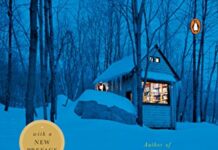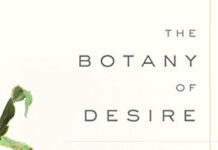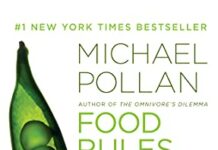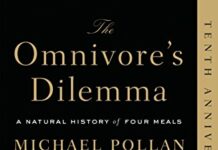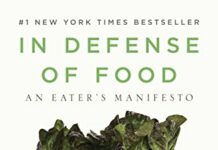
Ebook Info
- Published: 2013
- Number of pages: 496 pages
- Format: PDF
- File Size: 1.57 MB
- Authors: Michael Pollan
Description
Michael Pollan, the bestselling author of The Omnivore’s Dilemma, Food Rules, How to Change Your Mind, and This is Your Mind on Plants explores the previously uncharted territory of his own kitchen in Cooked. “Having described what’s wrong with American food in his best-selling The Omnivore’s Dilemma (2006), New York Times contributor Pollan delivers a more optimistic but equally fascinating account of how to do it right. . . . A delightful chronicle of the education of a cook who steps back frequently to extol the scientific and philosophical basis of this deeply satisfying human activity.” —Kirkus (starred review)Cooked is now a Netflix docuseries based on the book that focuses on the four kinds of “transformations” that occur in cooking. Directed by Oscar-winning filmmaker Alex Gibney and starring Michael Pollan, Cooked teases out the links between science, culture and the flavors we love.In Cooked, Pollan discovers the enduring power of the four classical elements—fire, water, air, and earth—to transform the stuff of nature into delicious things to eat and drink. Apprenticing himself to a succession of culinary masters, Pollan learns how to grill with fire, cook with liquid, bake bread, and ferment everything from cheese to beer. Each section of Cooked tracks Pollan’s effort to master a single classic recipe using one of the four elements. A North Carolina barbecue pit master tutors him in the primal magic of fire; a Chez Panisse–trained cook schools him in the art of braising; a celebrated baker teaches him how air transforms grain and water into a fragrant loaf of bread; and finally, several mad-genius “fermentos” (a tribe that includes brewers, cheese makers, and all kinds of picklers) reveal how fungi and bacteria can perform the most amazing alchemies of all. The reader learns alongside Pollan, but the lessons move beyond the practical to become an investigation of how cooking involves us in a web of social and ecological relationships. Cooking, above all, connects us. The effects of not cooking are similarly far reaching. Relying upon corporations to process our food means we consume large quantities of fat, sugar, and salt; disrupt an essential link to the natural world; and weaken our relationships with family and friends. In fact, Cooked argues, taking back control of cooking may be the single most important step anyone can take to help make the American food system healthier and more sustainable. Reclaiming cooking as an act of enjoyment and self-reliance, learning to perform the magic of these everyday transformations, opens the door to a more nourishing life.
User’s Reviews
Reviews from Amazon users which were colected at the time this book was published on the website:
⭐In “Cooked” Michael Pollan takes a look at the major processes that go into food preparation which he breaks into four categories – fire, water, air and earth. As with other books by Pollan there is a deep message in the writing and an underlying goal of the author to revitalize the reader’s interest in our historic food culture and the approachability of it at the individual level in modern society. The book sets the stage in the introduction asking the question of why to cook. He notes that the amount of time spent in the kitchen by people has declined dramatically in the last 50 years and how the argument of division of labour and time optimization might hold partially true- being totally removed from preparing what we consume to survive is much much more complicated than such simple economic logic.The book sets the stage by discussing the BBQ. It is a perfect opening to reinforce the author’s introductory criticims of modern food preparation as the social atmosphere defined by BBQs will always be an obvious reminder of the deeply social aspects of certain kinds of food preparation. The author researches heavily and takes the reader with him through his journey of finding the authentic BBQ. In reading the chapter i have a much larger where to eat next list… But the author combines food journalism of BBQ today with a historical account of the roast in our history and discusses some fairly deep concepts about what makes us human. The author introduces the idea that what makes us human is actually the ability to cook as by cooking we reduce the time and energy spent in digestion and allows for people to have evolved much larger brains that require economy of eating time. Not a central thesis of the book by any means, just an illustration that the philosophy of the author and examples all weave together to bring purpose to the writing.The author then goes into water and boiling food. This is less adventurous and seems slightly more introspective. Cooking food by boiling it is a more recent human invention as its dependent on a vessel to boil the water in after one has discovered fire. It is also a more domestic form of food preparation and as a result has more gender role connotations. The atmosphere of the campfire is different from the atmosphere of the person preparing a stew. Nonetheless the author discusses how all cultures boil food in various forms to both cook and improve flavour and at its core is a fairly common practice. The chemistry of what happens is discussed and the lessons learnt in terms of process. The author details how for himself the slow process of the food preparation filtered through to the family time enjoyed while talking and slowly eating the slow cooked meal.The author then moves into air and discusses baking. Baking is a form of food preparation that was subcontracted out of the kitchen hundreds of years ago (compared to roasting and boiling for example). The author gives himself the project of learning how to bake and starts in his home state of California. It is really interesting and it makes me feel like i am bread deprived. The science of breadmaking is really interesting and the industrial process of making the flour has the effect of reducing the nutritional content. The process of recombining nutrients to the bland white breads in modern supermarkets is discussed and shown to be predominantly a failure in terms of achieving nutritional goals. The author starts with a successful baking of a white flour sourdough and eventually works with original wholeweat cultures. I read this chapter and want to try the bread as well as all the bakeries that went into shaping this chapter…The author finally moves into Earth which is really his description for allowing nature and microbiology to take its course on food. In particular fermentation is detailed in two forms. The first is through pickling and the author tries to make sauerkraut, kimchi, and various other pickled foods. This seems the most straightforward to attempt at home as its a very slow process but the nuances are discussed and as with all forms of food preparation the author discusses there is an art to it given the science has its limits given the multitude of processes that are occuring. The author then discusses the art of cheesemaking and discusses the health aspects of the cheesemaking process. The author ends with a discussion of alcohol production and he attempts making beer. Given the beer kits involved are slightly more ready made than kits for other forms of food preparation, the first try for beer seems to turn out quite successfully on a a relative basis. The role of alcohol in social settings, its health contents and issues as well as its historic role througout civilization and consumption in the animal world is all discussed in a lively manner.I have always like Pollan’s books. They are entertaining and have humor. Despite the lightheartedness of the writing the deeper message is one that should be considered. Cooking doesnt have to be a chore and the spillover effects of moving from processed food to home cooked are countless. For him with cooking – home atmosphere is better, nutrition is better, value for money is better and his experiences are better all the while his social fabric gets stronger. Obviously the message isnt for everyone to prepare all aspects of their food intake but to shift the balance away from always buying prepared and trying to minimize time cooking is a questionable goal. Despite not being active in the kitchen I feel more invigorated to try after reading this. I learnt quite a bit as well as enjoyed the read.
⭐In his latest book, Cooked, Michael Pollan serves up another bestseller that looks at the relationships between us and the food we eat. Struck by the realization that “the less cooking we were doing in our own lives, the more that food and its vicarious preparation transfixed us,” Pollan sets out to explore the art of cooking for himself.Cooked reads like a how-to book for the uninitiated in the kitchen while still providing plenty of more detailed analysis for seasoned cooks. Divided into chapters based on the four classical elements – Earth, Water, Air and Fire – Pollan personally explores the world of cooking where “the stuff of nature gets transformed into the things we eat and drink.”In each chapter, Pollan learns about a corresponding cooking style: in Fire, he gets grilling lessons from a North Carolina barbecue pit master; in Water, he masters braises; in Air, he experiments with bread baking as he seeks to perfect the perfect sourdough loaf; and finally, in Earth, he explores various types of fermentation including pickling, cheese making and home brewing.Along the way, each of his teachers – from “the cheese nun” with a Ph.D. in microbiology to the “most famous fermentor in America” – is whole-heartedly devoted to his or her craft and, in the end, getting a glimpse into their lives and work is half the fun of the book.I’ve been a Michael Pollan fan since I first cracked the spine of The Botany of Desire more than a decade ago, but even I’ll admit, there are a few points in the narrative where even the most devout reader’s eyes may start to glaze over… like when Pollan gets mired in the details of the “all-important Lactobacillus sanfranciscensis” microbe.But only briefly. Because along with straight-up cool science, he also mixes into his narrative a bit of history, art and literature along with a dash of religion (“bread… is an everyday proof of the possibility of transcendence” and sex for good measure (“a cheese that stinks – of manure, of sex – offers a relatively safe way for us to flirt with forbidden desires”).As in his previous books, Pollan extolls the ills (literally) of processed foods and cautions against our over-reliance on corporations, “whose `dead food’ is damaging our health and `homogenizing’ our experience.”When asked why we don’t spend more time preparing our own meals, apparently most people claim a lack of time. But Pollan points out that, “in the last decade or so, we’ve all found two hours a day to be on line outside of work.” So what gives?Another entire book could be devoted to answering that question, but Pollan doesn’t take on that job in Cooked. Instead, he argues that we would all do well to start getting reacquainted with our kitchens because “cooking is one of the most interesting and worthwhile things we humans do.”While it may be cheaper and easier to rely on others to provide for our basic needs, “to live that way comes at a price, not least to our sense of competence and independence.” We are so disconnected from the makers of our food, Pollan argues, that we stop thinking about what is actually in the food we eat or where it comes from, much less the labor, money or energy it took to get it onto our plate.Worst of all, we forget that “what presents itself to us in the marketplace as a product is in truth a web of relationships between people… and all the other species on which we still depend.” (Yes, even bacteria.)In the end, Cooked turns out to be a commentary on the way we live. It’s true, as in his past books, that Pollan is critical of capitalism, and in particular consumerism, as the downfall of democracy and independence in its most literal sense. The antidote (or part of it, anyway) that he offers up here is cooking. To cook, he says, is to reclaim a bit of independence, and perhaps a bit of pride as well. It’s what separates us from the rest of the natural world and, paradoxically, also what keeps us connected to it.It is also an invitation to modern society (that’s you and me) to reconnect with the world. It’s true that few of us have the luxury of spending hours in the kitchen making all of our meals from scratch, but even small culinary contributions help us to reconnect with the natural world around us. As Pollan himself admits, “The most important thing I learned … is how cooking implicates us in a whole web of social and ecological relationships: with plants and animals, with the soil, with farmers, with the microbes both inside and outside our bodies, and, of course, with the people our cooking nourishes and delights.” And he invites us “to alter, however slightly, the ratio between production and consumption” in our lives.This, he believes, can make a difference. After trying his hand at home brewing, Pollan says, “The beer in that bottle, I’m reminded as soon as I brew it myself, ultimately comes not from a factory, but from nature – from a field of barley snapping in the wind, from a hops vine clambering over a trellis, from a host of invisible microbes feasting on sugars.”So, if preparing our own home-cooked meals makes us think just a little bit more about the world around us and how, ultimately, we all depend on one another to survive, then certainly a little time with a knife and cutting board won’t hurt anyone.For novices in the kitchen – or first-time Pollan readers – Cooked is sure to whet your appetite. For the rest of us, it is the continuation of an ongoing commentary on food, nature and modern society that will not fail to satisfy.
⭐I bought this book for myself, finished it and passed it on to my daughter, but then had to get another copy as I couldn’t bear to be without this book. I have to keep re-reading the section on the making of the Saint-Nectaire cheese – one of the most awe inspiring and profound things I’ve ever read. It made me stop and think a What IS that! in response to the description of the fascinating system of micro-organism processes taking place to produce – a cheese. Just stopped me in my tracks and I haven’t stopped thinking about this since. I wasn’t going to read the section on the pit- masters as I am veggie, but I did and was very glad I did, so much I didn’t know. The entire book is very informative, inspiring, and very enjoyable. I can’t recommend this book too highly, the appreciation of all our food and the love of cooking is there for everyone, and I find this book a continuous source of inspiration. Thank you, Michael Pollan.
⭐No a book if you want scientific understanding.A mind numbing catalogue of descriptions of each person who cooks – short, tall, thick or thin.How many descriptions of Barbeque Pits – 12?Explanation of a surviving restaurant after a freeway bypassed a town.
⭐I don’t usually bother with book reviews, as it’s so down to personal taste, but this is a thoroughly good book – well written and packed with interesting ideas and theories. I learnt far more than I ever expected to from a book that I thought was ‘just’ about cooking.Surprisingly easy to read, as well.
⭐Entertaining and really informative book. This is both a set of stories and explanation of much of the magic of cooking that I hadn’t really understood.A great gift for a foodie friend. Not too technical, not too long, I loved it.
⭐Having watched the documentary of this book on Netflix I was eager to know more. This book doesn’t cover any thing extra than the series but the detail is much greater. I have tried Michael’s sour dough recipe 3 times now and I’ve finally cracked it (photo attached)
Keywords
Free Download Cooked: A Natural History of Transformation in PDF format
Cooked: A Natural History of Transformation PDF Free Download
Download Cooked: A Natural History of Transformation 2013 PDF Free
Cooked: A Natural History of Transformation 2013 PDF Free Download
Download Cooked: A Natural History of Transformation PDF
Free Download Ebook Cooked: A Natural History of Transformation
